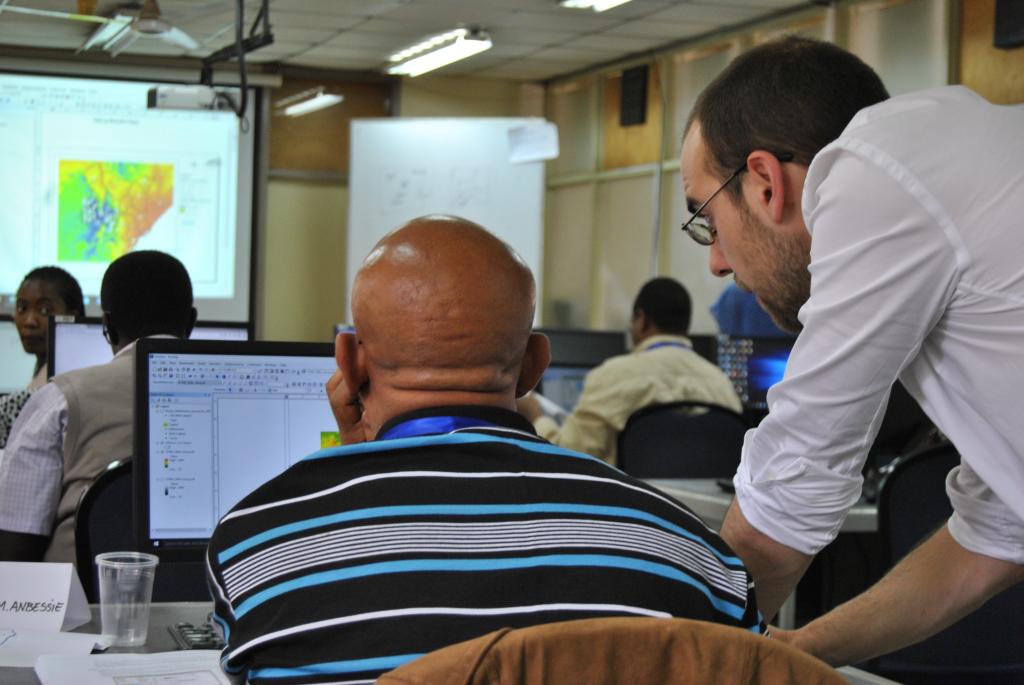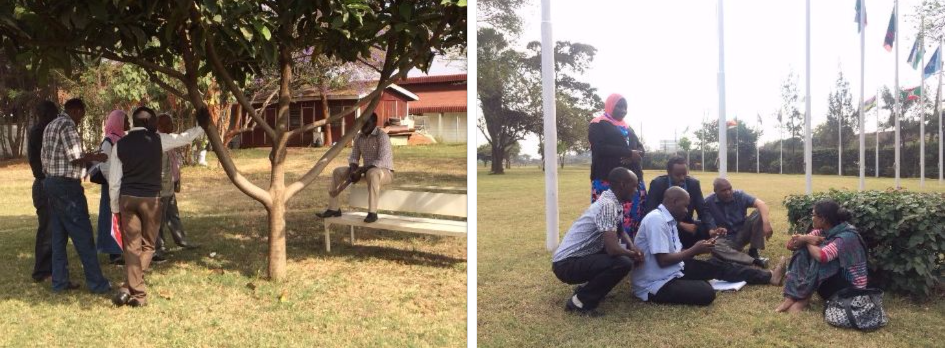Increasing Flood and Drought Management Capacities in East Africa using Geospatial Technologies
14 October 2016, Nairobi, Kenya – 27 technical experts from 10 Climate Prediction and Applications Centre (ICPAC) Member States (including Burundi, Djibouti, Ethiopia, Kenya, Rwanda, Somalia, South Sudan, Sudan, Tanzania and Uganda) of the Intergovernmental Authority on Development (IGAD) successfully completed a two weeks technical training on “Geospatial Technologies for Flood and Drought Management in East Africa” by UNOSAT. The training was delivered in partnership with ICPAC and the Regional Centre for Mapping of Resources for Development (RCMRD). It was held at the RCMRD campus in Kasarani, Nairobi from 19-30 September, 2016.
This was the sixth technical training delivered since the inception of the UNOSAT–IGAD partnership on the implementation of the project: “Building Capacity for Disaster Risk Reduction Using Geospatial Technologies in the Horn of Africa”. The project’s overall goal is to increase the capacity of IGAD and its Member States to perform mapping and data sharing in support of Disaster Risk Reduction (DRR) and early warning. The project has benefitted 95 GIS professionals across various line ministries and IGAD specialized agencies in the region through the training programmes delivered. Mr. Luca Dell’Oro, Programme Specialist at UNOSAT extended UNITAR-UNOSAT’s congratulations to the course beneficiaries and emphasized the impact of the acquired knowledge and skills to their work and countries respectively.
 The course, “Geospatial Technologies for Flood and Drought Management in East Africa”, focused on providing participants with technical skills to perform Geographic Information System (GIS)-based analyses to manage flood and drought risk. The core modules included lectures with hands-on exercises built on real case studies derived from past disasters in the region. In the laboratory simulation exercises, participants learnt how to extract floods from satellite imagery estimate flood risk, and monitor vegetation and precipitation conditions that could indicate drought conditions. Participants were further introduced to the recent development in geospatial visualization and communication such as the creation of web maps and story maps.
The course, “Geospatial Technologies for Flood and Drought Management in East Africa”, focused on providing participants with technical skills to perform Geographic Information System (GIS)-based analyses to manage flood and drought risk. The core modules included lectures with hands-on exercises built on real case studies derived from past disasters in the region. In the laboratory simulation exercises, participants learnt how to extract floods from satellite imagery estimate flood risk, and monitor vegetation and precipitation conditions that could indicate drought conditions. Participants were further introduced to the recent development in geospatial visualization and communication such as the creation of web maps and story maps.
The field data collection simulation exercise was based on a drought scenario using IGAD-ASIGN (a mobile data collection application), where participants interviewed ‘villagers’ to collect socio-economic data about the drought conditions of the area. The data from the field exercise was then displayed a live web map resulting to real-time results. The field findings allowed for a discussion on the applicability of data collection using the IGAD-ASIGN app that resulted into valuable inputs for future handling of hazards and risks.
Overall, the participants agreed that the course was relevant to their job and that it met the learning expectations. In addition, they all agreed that they would recommend the course to their colleagues. A participant from the Ministry of Water and Irrigation of Kenya stated that:
"The training was very useful, and it allowed me to understand how much I could do with GIS. Now I need to go back and unlock all the knowledge I have gained during this course.”

All participants successfully completed the course and were awarded a certificate of completion from UNITAR. Participants were also awarded a 1 year ArcGIS license from ESRI to support the application of the knowledge and skills gained from the course to their work. An online community of practice provided a virtual learning environment that diffused participants and the trainers. This online platform will continue running to allow participants to share and request technical support from peers and trainers on the application of the knowledge and skills acquired to their work.
The collaboration with IGAD-ICPAC is an important undertaking to increase the capacity of IGAD and its Member States to perform mapping and data sharing to advance DRR strategies and early warning mechanisms in the East African region. We are grateful to the generous funding from the Norwegian Ministry of Foreign Affairs in support of the project.
For more information, please visit unosat-igad-project
Photo1: UNOSAT’s Marcos Moreu assisting a participant during hands-on practical session on flood modelling.
Photos 2 amd 3: Data collection exercises with ICPAC’s Jully Ouma and UNOSAT’s trainer, Rohini Swaminathan acting as drought stricken farmers

